Enhance Staff and Student Experiences with a Connected Campus

On 15 September, Boris Johnson replaced Gavin Williamson with Nadhim Zahawi as Secretary of State for Education. Mr. Zahawi is the sixth person to hold this office since 2010.
The rapid pace of turnover in that important role triggered a recent discussion: are we or are we not preparing our young people and workforce for the most complex and competitive environment in human history? The data points to an urgent opportunity for Mr. Zahawi as he takes on the challenges of his new role—we need to invest in education now to ensure that the UK remains relevant in the future. Using that data, here’s a perspective on how we’re doing, a glimpse into the future, and how modern communications can help.
How UK Students Compare Internationally
PISA scores provide insight into the preparedness of the upcoming generation. The scores of our 15-year-olds are above the OECD average in all three areas: Reading, Mathematics, and Science. Sounds great! Unfortunately, we are behind the leading countries,China, Canada, Estonia, Hong Kong (China), Korea, Macao (China) and Singapore, in all three subjects. While our students are showing progress in reading and recent progress in maths, they’re steadily declining in science. It’s clear that advances in all industries depend on our ability to innovate. It’s critical that our educational institutions adequately prepare our students and workforce with the scientific knowledge and science-based research and development experiences that empower their ability to drive innovation.
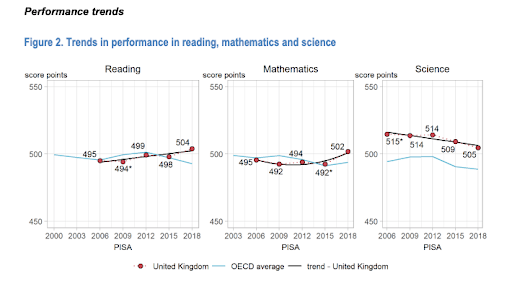
In general, the current PISA scores are ok, but they are showing signs of deterioration and falling behind those of the top countries. This trend points to the opportunity before Mr. Zahawi.
The potential impact of reducing investments in education
Are we putting our money where it counts to help Mr. Zahawi address this opportunity? There are a number of factors that impact total education spending, so it’s challenging to use that metric as a barometer for funding. With this qualification in mind, total spending on education in 2020-21 is down 14% from its peak in 2010-11, according to the Institute for Fiscal Studies’ report, “2020 annual report on education spending in England.”

A more useful measure is spending per student; this picture also shows declining funding over the last several years.
According to the Institute for Fiscal Studies’ report: “Further education colleges and sixth forms have seen the largest falls in per-pupil funding of any sector of the education system since 2010–11. Funding per student in further education and sixth-form colleges fell by 12% in real terms between 2010–11 and 2019–20."
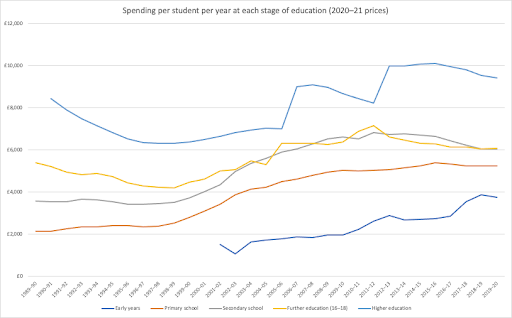
To answer that earlier question: it doesn’t look like we have been putting our money where it counts lately.
Recent research from McKinsey illustrates the potential impacts of not empowering our workforce and young people with the skills and education they need going forward. Their research report, “Facing the future: Britain’s new industrial revolution,” calls out: “manufacturers risk falling behind in reskilling their workforces—a broader challenge across the economy. Without concerted action, two-thirds of the UK workforce could lack basic digital skills by 2030, while more than 10 million people could be underskilled in leadership, communication, and decision making."
Without concerted action, two-thirds of the UK workforce could lack basic digital skills by 2030, while more than 10 million people could be unskilled in leadership, communication, and decision making. —McKinsey
Sobering.
So far, the answer to the question of how we're preparing our young people through education is… ok at this moment, with room for improvement. Declines in funding foreshadow future challenges and the potential for 10 million people to be underskilled in leadership, communication, and decision making by 2030. We, and Mr. Zahawi, have work to do.
Modern communications support modern education
This information and more is readily available, so none of it is a surprise. But, it’s not clear that the central government has been taking actions that use this information to drive investments that deliver different outcomes. What is clear is that education leaders are taking steps to ensure that their organisations remain beneficial to students and deliver a relevant education.
One way they are doing so is by leveraging modern communications capabilities that help them create a connected campus. This has proven to enable more convenient student experiences, increase organisational agility, and support new ways of delivering student learning outcomes.
Unfortunately, many educational institutions have neglected investing in their communications infrastructure. The pandemic made that point painfully clear as organisations scrambled to remain open and ensure service delivery. Admissions, student centres, medical services, and the bursar’s office are all examples of important departments that were impacted when everyone was suddenly relegated to working from home. There’s also the topic of instruction and how to effectively deliver it.
8x8 empowers educational organisations, students, and parents
Based on our work with educational organisations at all levels, we see that when organisations move to a modern communications platform like 8x8, they are able to reimagine staff and student experiences, as well as strengthen organisational resilience.
The 8x8 eXperience Communications Platform integrates contact centre, voice, video, chat, and APIs on a single platform to empower educational organisations with the communication capabilities that deliver campus-wide collaboration, real-time student engagement, and the flexibility to quickly adjust to dynamic events, such as Clearing. For those involved in maths tutoring, this platform offers a unique opportunity to connect with students in an engaging and interactive way. The integrated video and chat functions allow maths tutoring sessions to be conducted seamlessly, fostering a productive learning environment. With its adaptable communication tools, 8x8 ensures that maths tutoring can be managed effectively, regardless of location or changing schedules. Each service plan is tailored to each user's needs to optimise cost and productivity:
- Make and receive calls directly in Microsoft Teams
- Support Clearing with short-term (30, 60, 90 day) burstable omni-channel contact centre licenses
- Enable administrators, teachers, and students to connect from anywhere, anytime on any device
- Deliver innovative, affordable online classes anywhere using video meetings
- Enhance student convenience and well being with multichannel contact centres
- Manage the entire environment from a single, unified Admin Console
- Provide the services you need today with the flexibility to easily add new capabilities when required
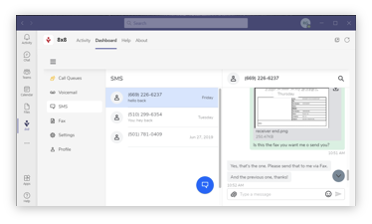
8x8 Voice for Microsoft Teams
8x8 Voice for Microsoft Teams is a cloud-based, direct routing service that enables Teams users to make and receive calls over the public switched telephone network (PSTN) using the native Teams desktop, mobile, or web app. For organisations that have adopted Microsoft Teams, 8x8 integrates directly with it using a simple three-step process:
- Authorise
- Connect
- Match
This brief video demonstrates these three easy steps.
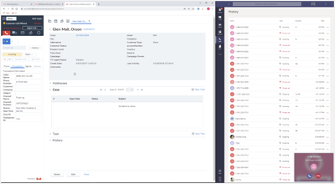
8x8 can also connect your contact centre to the rest of the organisation through a Microsoft certified Teams integration. This brief video demonstrates the possibilities for universities.

Reliability through high availability
Communication uptime is critical for all educational institutions. Using a university example to illustrate - they need to support annual clearing, student access to welfare services, and important programme information. The 8x8 eXperience Communications Platform ensures secure service delivery with four levels of redundancy and full transparency across all staff and student communications. And, it's backed by the industry’s first and only platform-wide 99.999% uptime SLA across both UCaaS and CCaaS.
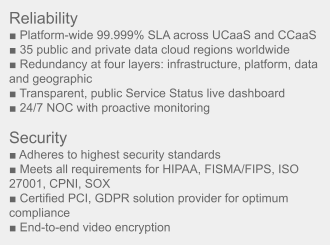
Visit the 8x8 Trust Site to learn more about 8x8’s industry-leading security, compliance, and reliability.
Real-time student engagement
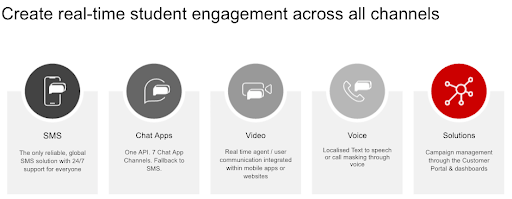
Educational organisations can connect with today’s digital native students and parents on their terms with the ability to integrate SMS, chat apps, voice, and video interactions into applications and websites. They can better engage students by providing admission deadline notifications, updates on events, and information on wellness programmes using these digital channels. And, they can make it easy and convenient for students and parents to stay connected throughout the school year.
Although we can’t influence the central government’s approach or the tenure of an Education Secretary, we can work with you to apply our decades of experience, patented technology and integrated cloud communications platform to help your organisation lower costs, improve service, and accelerate your ability to transform the education experience.
To learn more about how 8x8 can work with you to modernise your communications capabilities, connect with me on LinkedIn or visit 8x8.com.


